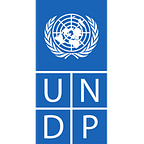Helping women break free from violence and gain power over their lives.
As the pandemic drags on, so does violence against women and girls, but there is hope.
Lumturie Ceka was no stranger to domestic violence before becoming the Local Domestic Violence Coordinator in the Municipality of Klos. Throughout her life, she has met and known many women, friends and relatives included, who have suffered from some form of violence — be it physical, emotional, or psychological — in their households and communities. Realizing that most domestic violence victims are in dire need of a voice and effective referral mechanisms, especially in smaller cities and towns, she goes the extra mile to help girls and women through the UNDP-supported Coordinated Referral Mechanism (CRM) to handle Domestic Violence in Klos.
It was through this mechanism, as one of 36 municipalities in the country supported by UNDP, that she came to meet V.D. — a mother of four children and a woman daily suffering physical and emotional violence from her husband.
V.D., who was also facing the constraints of her husband’s financial and social power and the seeming inability to report him, felt powerless. The children, who were already falling behind in school due to the lack of a father figure, also displayed difficulties making friends and engaging socially with their peers. They were often confused, angry and hopeless, all caused by the frequent scenes of violence they witnessed at home.
“When V.D. first reached out to me, she had already tried to react numerous times. It was immediately clear that this wasn’t going to be an easy case — she was convinced that the Klos Police was unable to help, mainly because her husband kept her locked inside their house, but also because he threatened no police officer would believe her, as opposed to him, who was friends with them all. Her situation only made me more eager to help — this is exactly why the Coordinated Referral Mechanisms exist in the first place,” says Lumturie.
Under the difficult circumstances, she urged V.D. to find the courage and report her husband in one of Tirana’s Police Stations. Meanwhile, she provided the five family members with an Immediate Protection Officer, while the abuser was forced to leave the house by the Klos Police and the Bailiff’s Office in Mat.
V.D. obtained a 3-month protection order, while her children were offered free psychological support during these months, so that they could regain a sense of normality and enjoy their childhood through proper education, friendships and re-found trust towards adults. Almost immediately, their performance at school improved — a significant indicator of the positive impact that the institutional response to domestic violence intervention had in the lives of the survivors and their children.
During the protection order, the family was kept under supervision, making sure that the perpetrator respected the restriction order and kept away from the family. Meanwhile, the Klos Coordinated Referral Mechanism continued instructing and advising V. D. on the steps she would have to follow if her husband tried to hurt them again. The rent bonus provided to the family by the Municipality of Klos helped them leave this traumatic event in the past and hopefully look forward in the future with some confidence. V.D. felt she had power over her life and choices again.
“Awareness is fundamental to change society’s behavior and gender equality norms and help in the fight against domestic and gender-based violence. The COVID-19 pandemic left many victims trapped with their abusers, so we intensified our efforts and worked closely with communities at the local level to inform and raise awareness among young men and women, teachers, and communities on the need to report DV,” says Lumturie.
Unfortunately, women and girls continue to experience domestic, sexual and dating violence, stalking and sexual harassment. Violence against women and girls in all its forms remains a grave violation of human rights. It is in this context that UNDP is supporting service providers to effectively implement legislation and normative standards on elimination of violence against women through its interventions — especially as the COVID-19 pandemic creates fertile ground for this other, often-hidden pandemic- gender-based violence. This support is provided as part of the UN Joint Programme “Ending Violence Against Women and Girls” funded by the Government of Sweden in partnership with the Ministry of Health and Social Protection.
During the pandemic, 371 domestic violence victims benefited from multiple services provided by professionals and 573 members of Coordinated Referral Mechanisms were trained on correctly using the protocol to handle domestic violence cases. Additionally, thousands benefited from awareness campaigns implemented on social media.
The first online, state-run, recording and tracking system on Domestic Violence cases REVALB has so far registered and tracked 6114 domestic violence cases, while the first ever state-run, one-stop, multi-sectorial, emergency ‘LILIUM’ Centre for sexual violence victims provided, integrated emergency support to over 70 survivors of sexual violence.
An equal society where every woman and girl feel safe and empowered begins with a single raised and a helping hand offered — and it is a society worth fighting for, every step of the way.
